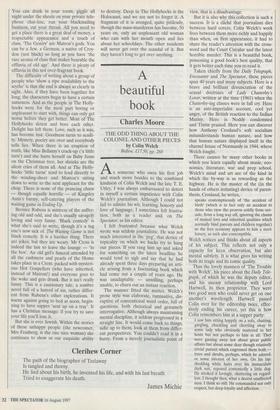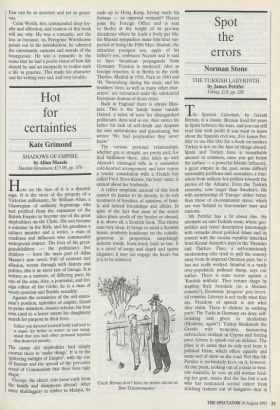A beautiful book
Charles Moore
THE ODD THING ABOUT THE COLONEL AND OTHER PIECES by Colin Welch Bellew, £1Z50, pp. 288 As someone who owes his first job and much more besides to the combined kindness of Colin Welch and the late T. E. Utley, I was always embarrassed to detect in myself a certain impatience with Colin Welch's journalism. Although I could not fail to admire his wit, learning, honesty and love of language, I sometimes felt frustra- tion, both as a reader and, on The Spectator, as his editor.
I felt frustrated because what Welch wrote was seldom journalistic. He was not much interested in the 'peg', that device of topicality on which we hacks try to hang our pieces. If you rang him up and asked for something on the latest headline he would tend to sigh and say that he had already spent three days preparing an arti- cle arising from a fascinating book which had come out a couple of years ago. He was unadaptable — unwilling, perhaps unable, to churn out an instant reaction.
The manner fitted the matter. Welch's prose style was elaborate, ruminative, dis- ruptive of conventional word order, full of questions, both rhetorical and genuinely interrogative. Although always maintaining mental discipline, it seldom progressed in a straight line. It would come back to things, sidle up to them, look at them from differ- ent perspectives. You couldn't read it in a hurry. From a merely journalistic point of view, that is a disadvantage.
But it is also why this collection is such a success. It is a cliché that journalism dies between hard covers. Colin Welch's work lives between them more richly and happily than when, on first appearance, it had to share the reader's attention with the cross- word and the Court Circular and the latest horrible murder. This is a beautiful book, possessing a good book's best quality, that it gets better each time you re-read it.
Taken chiefly from the Daily Telegraph, Encounter and The Spectator, these pieces span 40 years and many subjects. Here is a brave and brilliant denunciation of the sexual doctrines of Lady Chatterley's Lover, written at the time (1961) when the Chatterley-ing classes were in full cry. Here is an anti-imperialist account, cool yet angry, of the British reaction to the Indian Mutiny. Here is Noddy condemned and Tintin praised. Here you can discover how Anthony Crosland's soft socialism misunderstands human nature, and how that human nature displayed itself in the charnel house of Normandy in 1944, where Welch fought.
There cannot be many other books in which you learn equally about music, eco- nomics, literature, war and prep school. Welch's mind and art are of the kind in which the by-way is as rewarding as the highway. He is the master of the (in the hands of others irritating) device of paren- thesis. Crosland, he writes,
speaks contemptuously of 'the accident of birth' (which is in fact only an accident to those who view the process coldly from out- side, from a long way off, ignoring the chains of mutual love and inherited qualities which normally bind parents and children together) so the free economy appears to him a mere lottery, as such also contemptible.
Welch notices and thinks about all aspects of his subject. This reflects not only a capacity for keen observation, but also mental subtlety. It is what gives his writing both its tragic and its comic quality.
Thus the lovely manners of 'The Trouble with Welch', his piece about the Daily Tele- graph, of which he was the deputy editor, and his uneasy relationship with Lord Hartwell, its then proprietor. They were two good men who could never get on one another's wavelength. Hartwell passed Colin over for the editorship twice, effec- tively ending his career, yet this is how Colin remembers him at a supper party:
I saw him sitting happily on a sofa, chatting, gargling, chuckling and chortling away to some lady who obviously mattered to her hosts but not perhaps to him at all. They were gassing away not about great public affairs but about some dear though relatively trivial pursuit which engrossed them both trees and shrubs, perhaps, which he adored, or some interest of her own. On his lap, shedding white hairs over his immaculate dark suit, reposed contentedly a little dog. He stroked it lovingly, chattering on regard- less. I thought then, what a decent unaffected man. I think so still. He commanded not only respect, but deep loyalty and affection.
Few can be so accurate and yet so gener- ous.
Colin Welch, too, commanded deep loy- alty and affection, and readers of this book will see why. He was a romantic, not the less so because, as, Peregrine Worsthorne points out in his introduction, he admired the unromantic customs and morals of the bourgeoisie. He was a romantic in the sense that he had a poetic vision of how life should be and an incapacity to realise such a life in practice. This made his character and his writing very sad, and very lovable.



























































 Previous page
Previous page